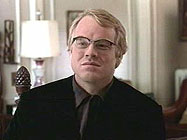|
|
|
|
State and Main
|
 |
|
A film crew arrives in the small, American town of Waterford, scouting for locations to fit a sanctimonious project called The Old Mill. There is enough in this place that will fit their fantasies of Old America – and what doesn't fit can be rapidly altered. David Mamet's State and Main sketches its principal characters and situations economically: Walt (William H. Macy), the director willing to find any solution to keep his project afloat; Joe (Philip Seymour Hoffman), the first-time screenwriter unused to massive, on-the-spot revisions; Bob (Alec Baldwin), the vain star with a weakness for young girls; and the many locals, each with a different interest in this circus that has hit their town. Mamet may have skills as a writer and guider of actors, but he is one of the stodgiest film directors in the game. His archly stylised, dialogue-laden scenes often feel as heavy as concrete. Plot points (like, here, the conspicuous hole in the main street) are announced and enacted in a clunky, mechanical way. Nothing sparkles or dances in his screen work; it all has the air of a didactic lesson. Mamet's film career took a turn for the better in The Winslow Boy (1999), because his naturally creaky style meshed uncannily well with Terence Rattigan's old-fashioned stage material. Indeed, Mamet's artlessness finally began to look a little avant-garde, inadvertently approaching the tactics of Portugal's great master, Manoel de Oliveira. State and Main returns us, less happily, to Mamet in his satirical mode. The large cast of colourful characters and the complications arising from their sudden mix is reminiscent of Robert Altman. But Mamet's models reach further back, to Preston Sturges (The Miracle of Morgan's Creek, 1944) and Frank Capra – there is even a character named George Bailey, the hero of It's a Wonderful Life (1946). Mamet tries to balance Capra's nostalgic fantasy of small-town Americana against Sturges' more caustic modern view. This gives State and Main its central irony: as Walt and his collaborators cynically aim for an "innocence" and "purity" of vision, the citizens of Waterford bone up on box-office and industry reports in Variety magazine. It is the Waterford folk most savvy about big city ways – the precocious teen Carla (Julia Stiles) and the jealous politician Doug (Clark Gregg) – who bring about the story's most tumultuous and satisfying developments. For the most part, Mamet's satire tends to jog on the spot, picking off easy targets like the tantrums of Claire (Sarah Jessica Parker), a vain and precious star, or the 'money talks' mentality of producer Marty (David Paymer). Running gags concerning Walt's indifference to a crew member's impending fatherhood and the inevitable bogey of 'product placement' constitute facile point-making. Mamet has more success with the dramatic and sentimental aspects of the tale. It would have been tempting to make Joe a guileless, pretentious fool, but his tentative romance with a local, Ann (Rebecca Pidgeon), has a genuine sweetness and moral weighting – thanks to some surprising plot manoeuvres late in the piece. There comes a moment in the best screen satires when the film bravely implicates itself in the hypocrisies, immoralities and injustices it has hitherto decried or mocked. Altman, Sturges and Billy Wilder all recognised the necessity of this self-accusing turn: after all, how high-handed can a Hollywood movie be? The high moral ground is, however, Mamet's preferred territory, and he is not about to cede it for anyone or anything. This inflexibility means that State and Main is a pleasant, touching, uniformly well-acted and occasionally telling comedy, but hardly the state-of-the-culture report that Mamet intends it to be. MORE Mamet: Hoffa, Glengarry Glen Ross © Adrian Martin June 2001 |
![]()